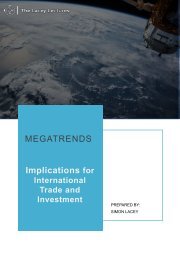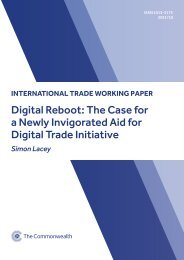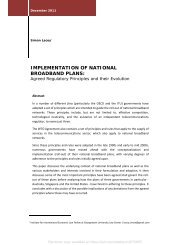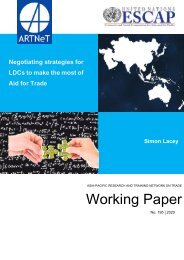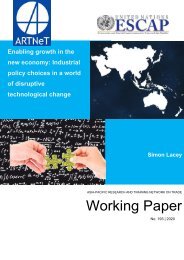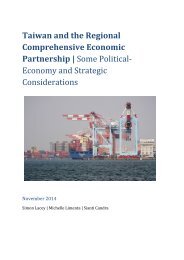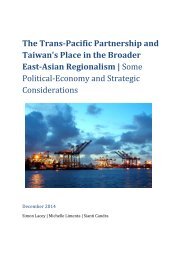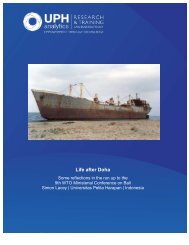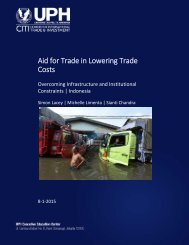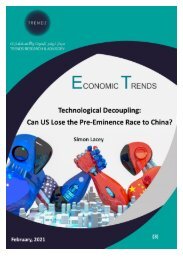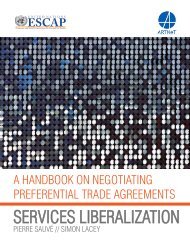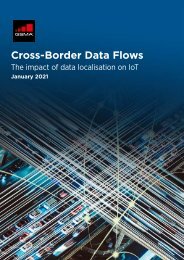White Paper Trade Rules and the Digital Economy Key Points and Findings
This synopsis document summarizes and articulates the key points and findings from the much longer 2017 White Paper on Trade Rules for the Digital Economy.
This synopsis document summarizes and articulates the key points and findings from the much longer 2017 White Paper on Trade Rules for the Digital Economy.
- No tags were found...
Create successful ePaper yourself
Turn your PDF publications into a flip-book with our unique Google optimized e-Paper software.
Huawei | <strong>Trade</strong> <strong>and</strong> <strong>the</strong> <strong>Digital</strong> <strong>Economy</strong> | <strong>White</strong> <strong>Paper</strong> <strong>Key</strong> <strong>Points</strong> <strong>and</strong> <strong>Findings</strong><br />
<strong>Key</strong> <strong>Points</strong> Explained<br />
01<br />
The WTO Work Program on Electronic Commerce in 1998 initiated a program of reflection<br />
by WTO members on how best to address <strong>the</strong> trade‐related aspects of <strong>the</strong> <strong>the</strong>n nascent<br />
internet economy, <strong>and</strong> focused predominantly on <strong>the</strong> need to negotiate new rules on e‐<br />
commerce. Likewise, <strong>the</strong> recently completed TPP negotiations, <strong>the</strong> outcome of which is uncertain at <strong>the</strong><br />
time of writing, <strong>and</strong> <strong>the</strong> recently stalled TiSA negotiations have also included dedicated provisions intended<br />
to liberalize cross‐border trade in services <strong>and</strong> establish disciplines on e‐commerce. However <strong>the</strong>re are<br />
o<strong>the</strong>r areas <strong>and</strong> rules that affect <strong>the</strong> digital economy that also need to be addressed both at <strong>the</strong> WTO as<br />
well as in free trade agreements. Also at <strong>the</strong> WTO we had some progress very early (in 1997) on an<br />
Information Technology Agreement (ITA, recently updated in 2015) which saw tariffs eliminated on a large<br />
number of IT products among participating WTO members. In <strong>the</strong> TPP we saw a range of new provisions<br />
addressing different aspects of <strong>the</strong> digital economy beyond e‐commerce, such as in <strong>the</strong> chapter on<br />
technical barriers to trade (rules on conformity assessment procedures, encryption <strong>and</strong> electromagnetic<br />
compatibility), as well as a new chapter on regulatory coherence, <strong>and</strong> new disciplines on <strong>the</strong> cross‐border<br />
supply of services. The more holistic approach taken in <strong>the</strong> TPP, although not perfect, is much more suited<br />
to addressing <strong>the</strong> plethora of trade‐related regulatory issues that different actors across <strong>the</strong> very broadranging<br />
value chain that represents <strong>the</strong> digital economy are increasingly encountering. We hope for <strong>and</strong><br />
advocate a similarly broad approach in o<strong>the</strong>r negotiating fora such as <strong>the</strong> WTO <strong>and</strong> RCEP.<br />
02<br />
We view TiSA <strong>and</strong> RCEP as two negotiating fora that could, if we are lucky, see <strong>the</strong><br />
emergence of new rules that would be of enormous benefit to <strong>the</strong> digital economy,<br />
particularly on issues such as cross‐border trade in services <strong>and</strong> e‐commerce for TiSA <strong>and</strong> a<br />
whole range of issues in RCEP including those mentioned above in Point 1. We also would like to express<br />
our support for an ambitious new negotiating agenda at <strong>the</strong> WTO in <strong>the</strong> context of <strong>the</strong> now very mature<br />
Work Program on Electronic Commerce. Also at <strong>the</strong> WTO we would welcome new negotiations, building<br />
on <strong>the</strong> work of <strong>the</strong> ITA, on non‐tariff barriers in <strong>the</strong> IT <strong>and</strong> ITC sectors, especially with respect to technical<br />
regulations that rely on international st<strong>and</strong>ards <strong>and</strong> <strong>the</strong> adoption of an MFN obligation for conformity<br />
assessment procedures (so that if an IT or ITC product is certified in one WTO member it can be exported<br />
to any o<strong>the</strong>r member without fur<strong>the</strong>r testing). Like we have seen for <strong>the</strong> ITA, new rules on non‐tariff<br />
barriers could first be agreed on a plurilateral basis with an open membership clause.<br />
03<br />
We at Huawei have come from very humble beginnings <strong>and</strong> fought many existential battles<br />
to become <strong>the</strong> global industry leader that we are today. Along <strong>the</strong> way we have benefitted<br />
from <strong>the</strong> openness that has characterized much of <strong>the</strong> global economy <strong>and</strong> many of <strong>the</strong><br />
markets in which we have been privileged to serve our customers <strong>and</strong> build relationships with our<br />
stakeholders. This journey has also contributed in no small way to <strong>the</strong> formation <strong>and</strong> streng<strong>the</strong>ning of our<br />
core values <strong>and</strong> guiding principles, which include support for free trade, open <strong>and</strong> fair competition on a<br />
level playing field <strong>and</strong> <strong>the</strong> protection of intellectual property rights. These principles will continue to guide<br />
us <strong>and</strong> we will advocate for <strong>the</strong>m in all <strong>the</strong> markets we do business in, both at home <strong>and</strong> abroad.<br />
04<br />
We also recognize that trade rules can be about more than just trade <strong>and</strong> investment<br />
liberalization or imposing disciplines to curb protectionism. Ra<strong>the</strong>r, we see trade rules <strong>and</strong><br />
<strong>the</strong> market opening that <strong>the</strong>y foster, as also acting to support development outcomes <strong>and</strong><br />
greater inclusion into regional <strong>and</strong> global value chains of small <strong>and</strong> medium sized enterprises, as well as<br />
micro businesses. We favor leveraging existing <strong>and</strong> future trade rules to not only bridge <strong>the</strong> digital divide<br />
but also exp<strong>and</strong> <strong>the</strong> reach of <strong>the</strong> digital economy, to create a more equitable <strong>and</strong> fairer world economic<br />
order where anyone who chooses to participate can. The digital economy has been <strong>the</strong> harbinger of many<br />
benefits <strong>and</strong> all <strong>the</strong> world’s people should be able to partake in <strong>the</strong>se new <strong>and</strong> exciting technologies.<br />
14




